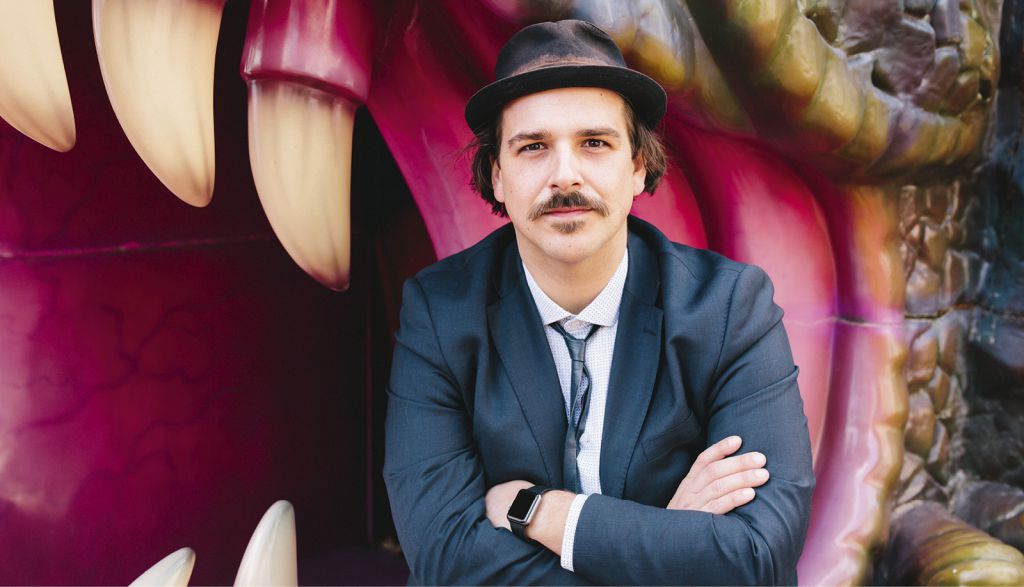EINSITZEN – Gespräche zur Setzung und Reflexion zeitgenössischer Dramaturgien und ihrer Residuen ist ein offenes Diskursformat, das im Rahmen des Universitätslehrgangs für angewandte Dramaturgie an der mdw konzipiert und den Launen der Zeit unterworfen ist. In unregelmäßigen Abständen werden Gäste aus Theater, Kunst, Literatur, Philosophie, Musik und anderen Lebenswelten vor das Mikrofon geholt.
EINSITZEN
[1] intransitiv: in einem Gefängnis inhaftiert sein
[2] transitiv: etwas durch wiederholtes Sitzen eindrücken
Beim ersten EINSITZEN am 18. Mai 2021 war der Autor und Dramatiker Ferdinand Schmalz zu Gast.
Barbara Kremser (BK): Wie hältst du es mit Eingesessenem?

Ferdinand Schmalz (FS): Eingesessen bin ich noch nie. Gott sei Dank. (lacht)
BK: Im übertragenen Sinn sitzen wir doch alle ein, oder?
FS: Stimmt. Jetzt sind wir alle zum Einsitzen gezwungen, wobei ich als Autor sagen muss, dass es befreiend ist zu wissen, dass alle anderen auch einsitzen müssen. Weil als Autor ist man schon immer zum Einsitzen gezwungen. Ich habe das letzte halbe Jahr damit verbracht, einen Roman zu schreiben. Das wäre sicher nicht in dieser Form gegangen, wenn ich gewusst hätte, dass die anderen irgendwo draußen unterwegs sind oder im Beisl sitzen. Das hat durchaus etwas Befreiendes gehabt, zu wissen, dass es nichts anderes zu erleben gibt.
BK: Also warst du ein Lockdown-Gewinner?
FS: (lacht) Durchaus.
BK: Dein erster Roman trägt welchen Titel?
FS: Der Roman hat denselben Titel wie der Bachmann-Preis-Text, weil er quasi eine Fortschreibung von diesem ist, und heißt Mein Lieblingstier heißt Winter. Und erscheint im Fischer Verlag.
BK: Du hast mir schon kurz davon erzählt, die Geschichte handelt von einem Bofrost-Fahrer …
FS: Genau, die Geschichte handelt vom Tiefkühlkostvertreter Franz Schlicht, der von Haus zu Haus fährt und Tiefkühlkost verkauft und dabei auf einen Kunden, Herrn Dr. Schauer, trifft, der beschließt, sich umzubringen, indem er sich in einen Eiskasten legen will. Der Tiefkühlkostvertreter Schlicht soll Schauer daraufhin nächtens auf eine Lichtung fahren, um dort auftauen zu können. Die Geschichte geht dann so weiter, dass Schlicht zum vereinbarten Zeitpunkt dort ist, die Leiche aber nicht. Der Eiskasten ist leer. Daraufhin begibt sich Schlicht auf die Suche nach der verschwundenen Leiche, und die Suche führt ihn durch die Wiener Vorstadt … Der Roman ist in gewisser Weise ein Wien-Roman geworden. Ungewollterweise! (lacht) Im Theater binde ich meine Texte nie an Orte, aber ich bin draufgekommen, dass das in der Prosa geht. Im Theater hingegen ist das komisch, wenn das Stück einen speziellen Handlungsort hat: Möglicherweise versuchen die Bühnenbildner dann, Otto-Wagner-Eingänge zu bauen, damit auch jeder weiß, dass es Wien ist.
BK: Möglicherweise braucht es im Theatertext eine spezifische Verortung nicht, weil durch die Inszenierung die Bühne ohnehin den Ort bestimmt?
FS: Ja, das könnte sein. Aber im Roman funktioniert die Verortung, weil eine Reise im Kopf leichter unternommen werden kann. Ich habe das Gefühl, dass in der Prosa eine Konkretisierung des Ortes besser funktioniert, weil sie filmischer ist. Und man auch leichter realistische Settings einbauen kann. – Wobei, es ist bei Weitem kein realistischer Roman geworden.
BK: Und warum hast du Wien als Ort des Geschehens gewählt? Weil du hier lebst?
FS: Wien, weil sich der Roman stark mit dem Tod auseinandersetzt und die Frage des Übergangs thematisiert, also wie man einen Übergang findet. So ein Vertreter der Postmoderne wie der Tiefkühlkostvertreter findet einen Übergangsritus für seinen Kunden. Da ist Wien als Ort naheliegend, weil Wien wie keine andere Stadt eine Verbindung zum Tod hat. Das war auch in meiner Arbeit für das Burgtheater, Jedermann (stirbt), Thema und ist im Roman noch stärker zu finden: diese Todessehnsucht. Man sagt ja auch, der Wiener kommt nur auf die Welt, um sein eigenes Begräbnis zu planen …
Auszug aus EINSITZEN mit Ferdinand Schmalz. Das komplette Gespräch können Sie hier nachsehen:
Ferdinand Schmalz, geboren 1985 in Graz, erhielt mit seinem ersten Theaterstück Am Beispiel der Butter 2013 den Retzhofer Dramapreis und wurde zum Nachwuchsdramatiker des Jahres gewählt. Sein Stück Jedermann (stirbt) wurde am Burgtheater uraufgeführt und mit dem Nestroy-Theaterpreis ausgezeichnet. 2017 gewann er mit einem Auszug aus Mein Lieblingstier heißt Winter den Ingeborg-Bachmann-Preis. Im Juli 2021 erschien im Fischer Verlag sein gleichnamiger Debütroman, der auf der Longlist des Deutschen Buchpreises und des Österreichischen Buchpreises 2021 steht. Ferdinand Schmalz lebt in Wien und lehrt im Universitätslehrgang für angewandte Dramaturgie an der mdw.
Universitätslehrgang für angewandte Dramaturgie
Dauer: 4 Semester (berufsbegleitend absolvierbar)
Lehrveranstaltungen: 1 x pro Monat (Do.–Sa. ganztägig)
Abschluss: MAS (Master of Advanced Studies)
Lehrgangskosten pro Semester: € 2.450
Anmeldefrist: 14. März bis 22. Juni 2022
Zulassungsprüfungen: 4. und 5. Juli 2022
Nächster Lehrgangsbeginn: Wintersemester 2022
Weitere Infos: mdw.ac.at/ikm/dramaturgie
Infoabend 5. April 2022, 19 Uhr
Institut für Kulturmanagement und Gender Studies (IKM)
Anton-von-Webern-Platz 1, 1030 Wien

